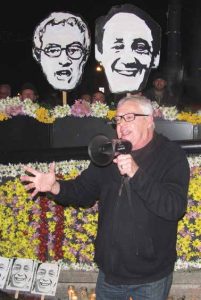 At the Openhouse annual Spring Fling brunch fundraiser on April 30, Cleve Jones will receive The Adelman Gurevitch Founders Award in recognition of his long-standing advocacy for LGBT rights, respect, and recognition. He conceived the NAMES Project AIDS Memorial Quilt and authored the book When We Rise: My Life in the Movement (Hachette Books, 2016), which partially inspired the epic miniseries When We Rise that aired last month on ABC.
At the Openhouse annual Spring Fling brunch fundraiser on April 30, Cleve Jones will receive The Adelman Gurevitch Founders Award in recognition of his long-standing advocacy for LGBT rights, respect, and recognition. He conceived the NAMES Project AIDS Memorial Quilt and authored the book When We Rise: My Life in the Movement (Hachette Books, 2016), which partially inspired the epic miniseries When We Rise that aired last month on ABC.
During a recent discussion with the San Francisco Bay Times, the legendary activist thoughtfully considered some of the most pressing issues LGBT seniors, and our entire community, face at this time.
“I just attended the opening for San Francisco General’s Golden Compass Program, a truly innovative and well thought out program for aging people with living with HIV—gay men, transgender individuals and the whole population of survivors,” he said. “As I looked at the room full of survivors, I was struck by the thought that all of these services are of no use if we are forced out of San Francisco. Housing is the most critical issue right now, so what they are doing with Openhouse is just the beginning of what we need to do.”
He explained that specialized social services, such as those provided by SF General, can be unique to San Francisco. Establishing similar programs elsewhere for the LGBTQ community would be challenging, could take years to accomplish and may not happen. As such, he emphasizes that “enabling people to stay here is so important. It’s extremely sad when we see someone who has contributed so much to our community be forced to leave.”
Aging only exacerbates the problem, he said.
 “It’s the issue of access,” Jones explained. “Often as we get older, and stop driving and using public transportation, access becomes more challenging, yet this is a population we want to keep close to us and to care for. The notion that we can live anywhere is not true. For people like myself with HIV, the single most important thing is to have a primary care physician who knows HIV/AIDS.”
“It’s the issue of access,” Jones explained. “Often as we get older, and stop driving and using public transportation, access becomes more challenging, yet this is a population we want to keep close to us and to care for. The notion that we can live anywhere is not true. For people like myself with HIV, the single most important thing is to have a primary care physician who knows HIV/AIDS.”
He strongly supports the work of Openhouse, and thinks that we could use “50 or more” 55 Laguna’s across the city, referring to affordable housing that is LGBT welcoming. So many of us are worried about our housing situations now, and even Jones is no exception.
“I am well aware of my privileged status as a white educated male who has health insurance, and I am remarkably fortunate,” he said. “I live in a rent controlled unit in the Castro, but over half of my take home pay goes to housing. Even with all of my good fortune, when I get evicted, which is inevitable, I will not be able live in San Francisco.”
He advised that we should all be very careful to try to save every penny possible. He also hopes to see future creative solutions to the housing crisis and other key problems facing not only our community, but also so many others.
“One of the things we need to be doing is asking: ‘What are the new ways that we can approach building a social structure that will keep us all safe?’”
He thinks of young people fleeing Alabama or Texas. He was able to come to San Francisco in the 1970s, yet he wondered, “Where would a 17-year-old Cleve go today? Why don’t we have an LGBT credit union, housing cooperatives, land trusts, co-ops? Economic needs transcend all of the boundaries of sexuality and race. There are issues that can unite us and cause us to use our economic clout to benefit all of us. The issue of a credit union for all of us is enormously important. I would like to see more self-reliance and more control over our own destiny in an intergenerational effort.”
He admits that ageism remains a problem, especially in the LGBT community, but it goes both ways. “I will say that a lot of people my age are pretty hard on the millennials,” he admitted, “and I think it is important not to lump everyone together in a generation and assume they share certain qualities. I get messages from young people every day on social media who want to learn more about our history and who are eager to do their part.”
He hopes to see more dialogue between older and younger LGBT individuals, and greater opportunities to facilitate such important exchanges.
For now, “It’s very clear to all of us that everything we have won hangs in the balance,” he said, referring to the current national political climate. “I hope all of you will take responsibility for defending our rights and our community, and doing whatever we can in our own personal lives to build unity because our community has always been fractured for various reasons. We are born into every type of family, color, religion, background, economic background. It’s easy to see why we are so divided in our community. It is understandable, but that is not something we can afford. We need to be kind to each other.”
Recent Comments